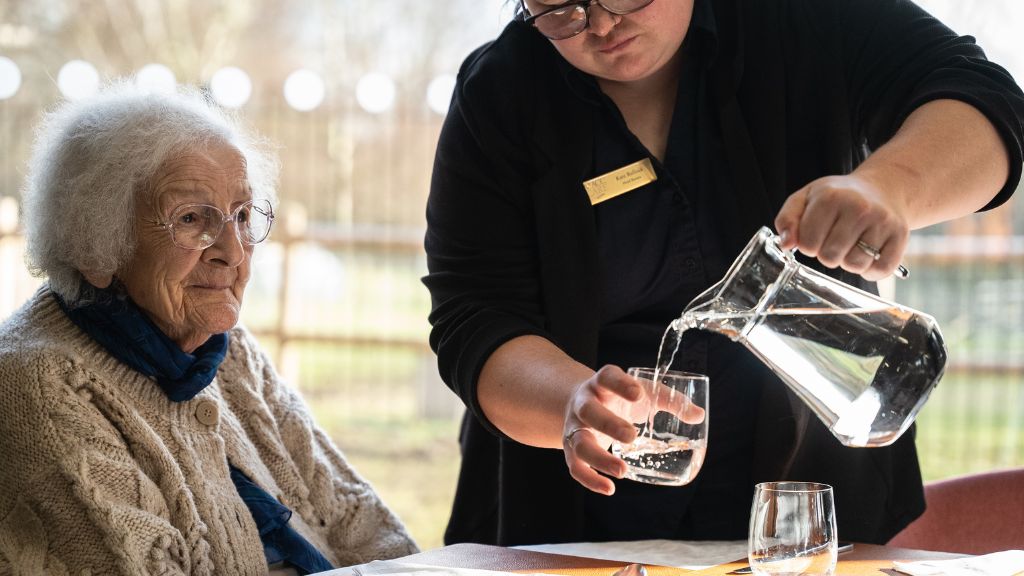Outstanding leadership
Beverley Manzar, registered manager at Ebury Court Care Home in Romford, East London, and the National Care Awards ‘Care home manager of the year’ in 2023, shares her experience of what it takes to deliver Outstanding care

Since the Care Quality Commission introduced the top rating of ‘Outstanding’, there have been multiple attempts to define exactly what this looks like in practice. The focus has always been on principles involved in delivering Outstanding care with little consideration of how these translate into practice. It would be fantastic to have an exact definition of Outstanding. However, as there is no blueprint, these are my thoughts based on my experience.
Recruitment, training, supporting and retaining staff, ensuring equality and transparency are hugely important but I feel the most important factor is establishing the culture and ethos which sets the tone of the organisation and embodies its values. It is essential that the owner shares these values as they are set from the top, cascade down and resonate throughout. Everyone is an equal part of the team but with different sets of responsibilities.
As registered manager, my job is full of challenges, rewards, angst, frustrations, joy, fun and happiness, but it is also deeply rewarding. I know I can make a difference to residents’ lives, ensuring they are happy and fulfilled, to families, who see their loved one happy and nurtured, to staff who spend a majority of their waking hours at work, as if they are happy and engaged, this will have a positive effect on their family life.
Staff are our tools to create the service that we want. The example you set matters. When you are around the home, in meetings or conducting supervision, the way in which you treat people will be noticed and emulated, sometimes directly and sometimes by osmosis as it seeps into staff practice. Your way of speaking, your way of behaving, the way you conduct yourself with your staff has a massive effect on staff behaviour, their attitude and performance. So, how do you get the right staff in place and retain them?
You need to assess candidate’s values, experience and their aspirations and the interviewing process should be constructed to get a good feel of them as a person because they will be working in the care home and these values will be pervasive and must accord with the organisation’s values. You could include questions like:
- What are your core values and how do they influence your decision-making
- How do you define success and how does it align with your values?
- Tell me about a time when you went the extra mile for someone? And why
- What would a perfect day look like and what values are represented in this choice?
It’s important to have a good understanding of a candidate’s values and feelings about working in care. How staff feel affects every aspect of their behaviour and while difficult to assess, it’s critical because their feelings have a tangible effect on residents and if they do not share the organisations values, they will be unhappy and unfulfilled. An unhappy member of staff will be disengaged, demoralised and produce an unhappy environment, staff turnover increases, standards drop, and residents are unhappy.
Having selected the right candidate, how to retain them?
Always prepare for new staff – they should be welcomed, their uniform ready, and the team should know of their arrival, so the new staff member feels valued and part of a worthwhile team.
Ongoing support such as training and supervision is critical – I supervise all my staff monthly as I believe this huge investment of time and energy is absolutely worthwhile. I know every member of staff really well and I am best placed to understand them as an individual, plan their development and support them in this process.
How do I construct supervision? At each session, I ask two questions:
Question 1: Give me a sentence about how you feel at this moment? Staff could say they are happy and contented, or not happy. In this way, I know exactly how each member of staff feels and it can reveal things they are unhappy about. It also provides me with a monthly snapshot of how every member of staff feels. Negative staff feelings translate into negative action.
Question 2: Culture and ethos. What is it about the culture and ethos of Ebury Court that makes you want to continue to work here? Staff say we feel listened to, valued, supported, important, and can make a worthwhile contribution and enjoy the continued learning and development.
At the end of supervision, I also ask them to rate themselves on my satisfaction scale of 1 to 10. 1 = I am very unhappy and 10 = I am very happy. After a short time, new members of staff often rate themselves ‘10’ because this question is not about knowledge and training, it is about how they feel at this particular moment.
Training is of critical importance. If you retain staff, once they have completed basic training, you can then train them at a higher level with no revolving door where you are continually repeating basic training which is demoralising and means your service probably always remain at the same level.

I am a practice teacher and enjoy training my staff. It is really effective as I can use the challenges that current residents present to illustrate how to deal with a variety of situations. I don’t use overheads but include case studies where members of staff role play challenging situations. This has been particularly affective for end-of-life care, for example, breaking bad news. Staff can practise their skills in a safe environment and get constructive feedback. At the end, I present a role play scenario as an example of best practice which enables staff to see the optimum way to manage these challenging situations. My training also enables me to reinforce the organisation’s values and demonstrate how to deliver high-quality care in an Outstanding home.
Working in partnership with the owner of the business is critical. You must have a shared vision to deliver the highest quality of care. The owner must support new ideas and innovations thus improving the service. I introduced two innovations at Ebury Court which would be impossible without the full commitment of the owner.
Namaste Care for residents with end stage dementia. This programme runs from 10-12pm, 2-4pm, 365 days a year. Audit outcomes evidenced decreased or eradication of urinary tract infections, pain, use of anti-psychotic medication, improved quality of life and improved staff and relatives experience. My paper was published in American Journal of Alzheimer’s Disease & Other Dementias (October 2015).
The Lavender Club, for those with no or mild-to-moderate dementia: fun, meaningful activities in the form of a club, 10-12pm, 2-4pm and 7-9pm. The results are extremely successful – residents are engaged, reduction in falls, sleep patterns improved as residents are engaged and quality of life for attendees has measurably improved.
Working with the owner, we have a shared vision and are committed to retaining our Outstanding rating. If you care, staff care, which means the residents receive the very best of care which, after all, is what we are all here to do. You must really want to be the best and provide the best
Beverley Manzar is speaking at the Care Management Show, which takes place on 29-30 November 2024 at London’s Excel.




